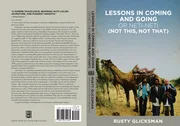Glicksman, an American English professor and jewelry importer before his death in 2021, recaps three decades of periodic sojourns in the Middle and Far East starting in 1971. The author usually traveled on his own, in threadbare circumstances. His destinations included Turkey, where he encountered “hashish of a legendary quality” that made “the air…thick and wavy,” Afghanistan, where he endured “merciless heat” during a rooftop bus trip with the help of “a gigantic spliff” of “fine Afghan hashish,” and Katmandu, which boasted “government hashish shops…where you ordered as much as you wanted.” But his heart belonged to India, less for the hash than for the spiritual profundity of its Hindu and Buddhist lifeways. Glicksman took in funeral cremations in the holy city of Varanasi; watched as a snake charmer got several cobras—and an awestruck crowd—swaying in unison to his hypnotic tune; was menaced by a monkey that imperiously ransacked his room for food; did relief work in the Indian state of Andhra Pradesh, where he was appalled by the death and devastation from a cyclone; engaged in searching philosophical discussions at ashrams; and “inhaled deeply of air that seemed to come from a much older time, a time, perhaps, when men shared the earth with gods” at the temple of Hadimba Devi. An epic 1985 trek to Tibet’s capital of Lhasa ended with a brief, poignant love affair with a Chinese teacher. Later chapters on his travels in the 1990s sound an autumnal note as the author registers the creeping commercialization in once unspoiled Indian towns engulfed by the tourist trade and mourns the waning of his youthful tolerance of grungy authenticity.
Glicksman’s is a beguiling, sometimes-prickly, always compelling voice; he’s raptly attuned to and respectful of his surroundings, but always uncomfortably aware of his status as an outsider looking in, entranced by Eastern religious culture but too questioning and too set in his Jewish heritage to wholly embrace it. (He’s also politically outspoken, on everything from his opposition to the Vietnam War to his loathing of nuclear power.) Glicksman’s ravishing prose is full of fresh, evocative takes on landscapes—“how light and airy the [Taj Mahal] looked….like a butterfly resting on a leaf, readying to take flight.” There is a spirituality evident in the writing, one that comes not from theology but from a painstaking, open-hearted observation of reality. (“[H]er hands and face laid waste by leprosy, this woman made pariah by the superstition of man, returned my stare with one of the most beautiful smiles I had ever seen. She had splendid white teeth. From a ravaged freak, she transformed before my astonished gaze into a princess, an angel, and Mother India gave me yet another nudge into uncharted waters.”) This memoir is an entrancing saga of a man expanding his soul by resolutely abandoning his comfort zone.
